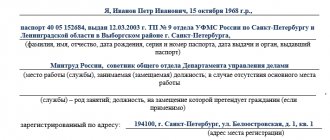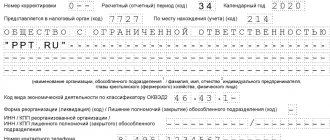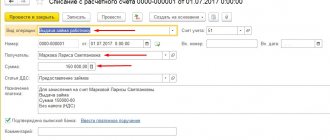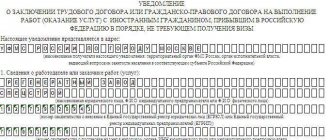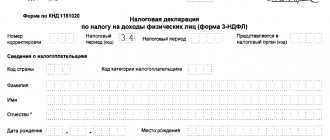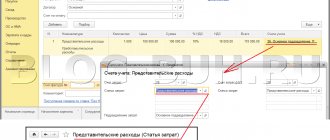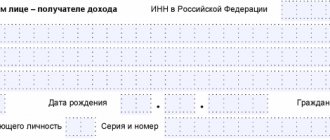Russian organizations that made payments to foreign companies without permanent representative offices in Russia are income tax agents (clause 1 of Article 289 of the Tax Code of the Russian Federation). The agent is obliged to withhold and remit tax on the taxable income of the foreign counterparty, although the agent himself may not even be a payer of income tax. The agent must report payments on a special form called Tax Calculation of Amounts Paid to Foreign Organizations for Income and Taxes Withheld. In the article we will tell you what kind of calculation this is, when it is due, and we will give an example of how to fill it out.
Calculation form
The new form of tax calculation was approved by order of the Federal Tax Service of Russia dated March 2, 2021 No. ММВ-7-3/115. The procedure for filling it out is given in the same order. The order took effect on April 10, 2021 and applies to settlements that organizations file after that date. In this regard, the Federal Tax Service of Russia explained that calculations for the first quarter of 2016 (for quarterly reporting) or January–March 2021 (for monthly reporting) can be submitted on both new and old forms (letter dated April 11, 2021 No. SD-4-3/6253). In both cases, tax inspectorates must accept them. Starting with reporting for the half-year (January–April) 2021, submit calculations only using the new form.
Composition of the calculation
The calculation includes:
- title page;
- section 1;
- section 2;
- section 3 (subsections 3.1, 3.2, 3.3).
Start filling out the calculation from the title page and subsections 3.1, 3.2 and 3.3 of section 3. After that, fill out section 2 and lastly, section 1. If there is no data for subsection 3.3 of section 3, do not include it in the calculation.
Number all pages in order, indicating their numbers in the boxes at the top. For example, the first page (title page) is “001”, the 12th page is “012”.
Title page
On the title page, indicate general information about the organization - tax agent.
TIN and checkpoint
At the top of the sheet, indicate the TIN and KPP of the organization. Take the TIN and KPP from the registration notice issued by the Federal Tax Service of Russia upon registration. Fill out the cells reserved for the TIN, starting from the first cell. Place dashes in the remaining free cells.
If the calculation is submitted by the largest taxpayer, indicate the checkpoint assigned by the interregional or interdistrict inspection (clause 5 of the appendix to the order of the Ministry of Finance of Russia dated July 11, 2005 No. 85n). Take it from the notice of registration as the largest taxpayer.
Correction number
How to fill out this field depends on what kind of calculation the organization submits. If this is the usual (first) calculation for the period, put “0—” in the “Adjustment number” field. It’s another matter if the organization has already submitted calculations for the past period, but wants to correct some information in it. In this case, enter the serial number of the correction (for example, “1—” if this is the first clarification, “2—” for the second clarification, etc.).
Tax (reporting) period
In the line “Tax (reporting) period (code)”, indicate the code of the period for which you are submitting the calculation. The calculation is made for the reporting (tax) period in which the tax agent actually paid income to foreign organizations (clause 1 of Article 310 of the Tax Code of the Russian Federation). Tax agents who report income taxes quarterly and monthly fill out the “Reporting (tax) period” field differently. For example:
- code 21 – for the first quarter;
- code 34 – for the year when submitted quarterly;
- code 37 – three months;
- code 46 – for a year with monthly filing.
All codes for this field are given in Appendix 1 to the Procedure, approved by Order of the Federal Tax Service of Russia dated March 2, 2021 No. ММВ-7-3/115.
In the “Reporting year” line, reflect the year for which you are submitting the calculation. Let's say you file your 2021 tax return for the first quarter of 2021. Then enter “2016” here.
Submitted to the tax authority
Submit your tax calculation to the inspectorate at the location of the organization. If the organization is classified as the largest, submit the calculation to the inspectorate at the place of registration as the largest taxpayer (clause 1 of Article 289 of the Tax Code of the Russian Federation). In the line “Submitted to the tax authority...” enter the inspection code. It is indicated in one of the documents issued by the Federal Tax Service of Russia:
- notification of registration;
- notification of registration as a major taxpayer.
In the line “at location (accounting) (code)”, enter the code depending on the capacity of the organization submitting the calculation. So, for example, provide the code:
- 214 – if this is an ordinary organization;
- 213 – if it is the largest taxpayer;
- 245 – if it is a permanent representative office of a foreign organization;
- 335 – if this is a separate division of a foreign organization in Russia.
The codes for this line are given in Appendix 1 to the Procedure approved by Order of the Federal Tax Service of Russia dated March 2, 2021 No. ММВ-7-3/115.
Name of the organization
In the line “Full name of the organization”, indicate the name of the legal entity exactly as stated in the constituent documents. If it is registered in Latin transcription, enter it. Enter capital letters of the name into the cells of the field, starting from the left edge. In the cells that are left empty, put dashes.
Reorganization or liquidation
Fill out the lines “Form of reorganization (liquidation) (code)” and “TIN/KPP of the reorganized organization” only if you are submitting a payment for the reorganized organization. In other cases, put dashes here. If the reorganized organization has not submitted calculations for the last year before the date of deregistration, it is submitted by the legal successor to its tax office.
On the cover page of the payment for the reorganized organization, indicate:
- in the field “at location (registration)” - code “215” (at the location of the legal successor who is not the largest taxpayer) or “216” (at the place of registration of the legal successor who is the largest taxpayer); 0 – upon liquidation;
- in the upper part of the title page - TIN and KPP of the successor organization;
- in the fields “Full name of the organization”, “TIN/KPP of the reorganized organization” - the name, TIN and KPP of the reorganized organization.
In the “Form of reorganization (liquidation) (code)” field, enter the code, for example:
- 0 – upon liquidation;
- 1 – during reorganization in the form of transformation;
- 2 – during reorganization in the form of a merger.
This is provided for in clause 2.5 of the Procedure approved by order of the Federal Tax Service of Russia dated March 2, 2021 No. MMV-7-3/115. Codes for forms of reorganization and liquidation are given in Appendix 1 to this Procedure.
Telephone
In the line “Contact telephone number”, indicate the mobile or landline telephone number of the accountant or tax representative, that is, the one who prepared the calculation.
How to determine other income of non-resident companies
Tax legislation does not explain the composition of other income of non-resident organizations, which creates a certain ambiguity in the case of payments that are difficult to classify as one of the categories of paragraph 1 of Art. 309 of the Tax Code of the Russian Federation.
Over the past years, explanations from tax authorities and decisions of courts of various instances have formed two main judgments on this issue:
| Other income of foreign firms is | Rationale |
| Income similar to those given in paragraph 1 of Art. 309 Tax Code of the Russian Federation |
|
| Any rewards not included in those provided for in paragraph 1 of Art. 309 of the Tax Code of the Russian Federation and not associated with ordinary activities (except for real estate transactions) |
|
Due to the vagueness of the wording of the term “other similar income,” we recommend checking the practice of judicial proceedings in order to avoid a dispute with tax authorities about the legality of taxation of a particular foreign company.
For more information about the income included in the calculation, see the material “Tax agent for income tax when paying income to a foreign organization.”
Section 3
In section 3, provide the following information:
- about foreign organizations to which the tax agent paid income in the last quarter or month;
- about income paid in this period and taxes withheld;
- about persons having actual rights to these incomes.
Important: if there were no payments in the last quarter (for quarterly reporting) or in the last month (for monthly reporting), do not include section 3 in the calculation (letter of the Federal Tax Service of Russia dated April 13, 2021 No. SD-4-3/6435) .
Foreign organizations that receive income in Russia are divided into four categories. Each category is assigned its own code - a sign of the income recipient. These are the codes:
- 1 – foreign bank;
- 2 – a foreign organization whose income is taxed under Article 310.1 of the Tax Code of the Russian Federation;
- 3 – a foreign bank, whose income is taxed under Article 310.1 of the Tax Code of the Russian Federation;
- 4 – other foreign organizations.
For each foreign organization, fill out as many sections 3 as the number of characteristics of the recipient that correspond to it. Let’s assume that a foreign bank was paid both income taxed under Article 310.1 of the Tax Code of the Russian Federation and other income. In this case, fill out two sections 3 with information about this bank, income paid to it and taxes withheld.
Assign each section 3 a unique number - write it under the section name. Number all sections 3 in order. In this case, all cells must be filled in. For example, the first section 3 is “000000000001”, the twenty-fourth is “000000000024” (clause 6.1 of the Procedure approved by order of the Federal Tax Service of Russia dated March 2, 2021 No. ММВ-7-3/115).
Calculation sections: where to start filling out tax accrual data
The report form includes a title page and three sections:
- the calculated amount of income tax to be paid;
- calculation of taxes on payments to non-residents;
- calculation of remuneration paid to non-resident companies and amounts of withheld tax.
The calculation must be completed on an accrual basis from January 1 of the next year. The currency of payment of remuneration is also the main one for filling out the report. In this case, amounts in Russian rubles are rounded to whole numbers, and amounts in foreign currency are left without rounding.
Since each subsequent section performs a decryption function for the previous one, the report should be filled out from the end. In this case, there is no need to fill out section 3 if non-residents did not receive payments during the reporting period (letter of the Federal Tax Service “On filling out tax calculations” dated 04/13/2016 No. SD-4-3/6435).
Subsection 3.1 section 3
For each unique number of section 3, fill out a separate subsection 3.1. In it, indicate information about the foreign organization to which the tax agent paid income in the last quarter (month).
Full name, country of registration (incorporation) code, address
This is the full name of the foreign organization - the recipient of the income. If it has a name in both Latin and Russian transcription, indicate both options in subsection 3.1. If the documents contain one version of the name (either Latin or Russian), indicate only that. If there is a document confirming the permanent location (residence) of the organization in a foreign country, rewrite the name from there.
At the bottom of subsection 3.1, provide the details of this document: date, number and country code according to the OKSM classifier.
Address of the foreign organization
Take the data for this detail from the primary documents on the basis of which the income of the foreign organization was paid (for example, from an agreement or contract). The line may not be filled in if the income was paid to the bank for which the SWIFT code is indicated below.
Taxpayer code in the country of registration (incorporation)/SWIFT code
Please provide your tax code or its equivalent here. It is assigned to a foreign organization in the country of registration (incorporation). Enter it if income is paid:
- to a foreign bank whose SWIFT code is unknown;
- another foreign organization.
If you know the SWIFT code of a foreign bank, enter it in this field.
Subsection 3.2 section 3
For each unique number of section 3, fill out a separate subsection 3.2. In it, indicate information about the income paid to the foreign organization in the last quarter (month) and the taxes withheld from them.
Serial number, code and symbol of income
Assign a number in order to each income that is paid to a foreign organization. For example, the first income is “000000000001”, the twentieth “000000000020”, etc. Fill out as many sheets of subsection 3.2 as the amount of income paid by unique number.
Take the income code from Appendix 2 to the Procedure approved by Order of the Federal Tax Service of Russia dated March 2, 2021 No. ММВ-7-3/115. For example:
- 01 – dividends;
- 12 – income from the use of intellectual property rights in the Russian Federation;
- 17 – income from the sale of movable property.
Indicate the income symbol if the recipient of the income is a foreign bank. In other cases, put a dash in this field. Income symbols are given in the Rules for Accounting in Credit Institutions, approved by Bank of Russia Regulation No. 385-P dated July 16, 2012.
Amount of income before tax
In line 40, enter the income that is due to the foreign organization under the agreement - in the currency in which this income was paid. In some cases, it is not the entire amount of income that is taxed, but the difference between income and documented expenses. In particular, this rule applies to the sale of Russian real estate (subclause 6, clause 1, clause 4, article 309 of the Tax Code of the Russian Federation).
If there are documents confirming the expenses of a foreign organization, indicate in line 40 the difference between income and expenses. If there are no such documents, provide here the entire amount of income accrued under the agreement.
Currency code, date of payment of income, date of calculation (withholding) of tax
For line 050, take the currency code in which the foreign organization receives income from the All-Russian Currency Classifier.
On line 060, indicate the date when the money was debited from the bank account or issued from the cash register. If the income was paid in kind, enter here the date when the items were transferred. If the obligations are repaid by offset - the date when the agreement on it was signed. On line 080, indicate the day when the tax was calculated and withheld from the recipient’s income.
Tax rate
This line is for the tax rate at which tax is calculated on income paid to a foreign organization. Either fill in or cross out all cells in the field. For example, if the tax rate is 15 percent, enter “15.—” here, if the tax rate is 0 percent, enter “0-.—”. Profit tax rates are established by Article 284 of the Tax Code of the Russian Federation.
If preferential tax treatment is applied to the payment, please indicate here:
- reduced rate (for example, “7-.5-” – if the tax rate is 7.5%);
- “99.99” – if the income is exempt from taxation.
Apply benefits if a foreign organization has submitted documents confirming that its activities are subject to an international treaty (agreement on the avoidance of double taxation) (clause 1 of Article 312 of the Tax Code of the Russian Federation).
Place 3 dashes in lines 080–140 of subsection 3.2 of section if:
- income is exempt from taxation;
- tax rate 0 percent;
- the person has the actual right to income (in line 020 of subsection 3.3 of section 3 the code “2” or “4” is indicated). In this case, also cross out line 160.
This follows from paragraphs 2.4, 8.1 and 8.7 of the Procedure approved by Order of the Federal Tax Service of Russia dated March 2, 2021 No. ММВ-7-3/115.
Tax amount and payment deadline to the budget
On line 100, indicate the amount of tax that was withheld from the income of the foreign organization - in the currency in which it received the income. To do this, multiply the amount of income before tax (line 040) by the tax rate (line 070).
The deadline for paying tax to the budget is the deadline established by paragraphs 2 and 4 of Article 287, as well as paragraph 11 of Article 310.1 of the Tax Code of the Russian Federation.
Official ruble exchange rate on the date of tax transfer to the budget
If a foreign organization received income in rubles, put a dash here. If the money was paid in foreign currency, indicate its exchange rate established by the Bank of Russia on the date when the tax was transferred to the budget.
Amount of tax in rubles and date of transfer of tax to the budget
The tax amount in rubles (line 140) is the product of the tax amount in foreign currency (line 100) and the official exchange rate on the date of payment of the tax to the budget (line 120). It happens that the tax agent did not remit the tax in the last quarter or month, since the deadline for payment fell on the next reporting (tax) period. In this case, the procedure for filling out line 140 depends on how the income was paid - in rubles or in foreign currency.
If a foreign organization received income in rubles, put a dash in line 130, and in line 140 - the tax amount in rubles. If the income is paid in foreign currency, it is important whether the withholding agent paid the tax before filing the calculation. If at this moment the tax is transferred to the budget, fill out both line 130 and line 140. If the tax is not transferred, put dashes in lines 120–140. Do not take into account the amount of this tax in line 040 of section 2 and in line 040 of section 1 of the calculation.
When calculating for the period in which the tax payment date fell, fill out a separate section 3 for the income from which the tax was withheld. Indicate there the amount of tax in rubles, the date of its payment and the official exchange rate on this date. Include the amount of tax paid in line 040 of section 2 and line 040 of section 1.
Such rules are established by clause 8.13 of the Procedure approved by order of the Federal Tax Service of Russia dated March 2, 2021 No. ММВ-7-3/115.
Code of actual right to income
The actual right to income paid to a foreign organization may not be held by it, but by someone else. Enter here the code from Appendix 1 to the Procedure approved by Order of the Federal Tax Service of Russia dated March 2, 2021 No. ММВ-7-3/115. For example:
- 00 – if the tax agent does not know who has the actual right to the income;
- 01” – if the tax agent knows who has the actual right to the income.
Basis for reduced tax rate or tax exemption
A reduced tax rate or exemption of income from tax may be established by the Tax Code of the Russian Federation or an international treaty (agreement). Indicate in line 160 of subsection 3.2 of section 3 the desired subclause, paragraph, article of this document. Fill in the cells of the field with capital letters, and put dashes in the remaining empty cells.
Information about the issuer of issue-grade securities
Fill in this field if you paid a foreign organization income on equity securities (except for income on state or municipal securities).
Taxable income of a foreign organization
For convenience, we have shown them in a table.
| Type of income | Maximum tax rate <*>, % |
| Dividends | 15 |
| Income from the distribution of profits or property of organizations, including upon their liquidation or withdrawal of a participant from the LLC | 20 |
| Interest on debt obligations of any type | 20 |
| Income from the use of rights to intellectual property in the Russian Federation, in particular: – license fees (royalties); – payments under a commercial concession (franchising) agreement | 20 |
| Let us note that, according to the Ministry of Finance, such payments are subject to Russian income tax, even if the very right to use intellectual property will be used outside the Russian Federation. Income from the sale of exclusive rights is not subject to withholding tax | |
| Income from the sale of shares (stakes) of Russian organizations, more than 50% of whose assets consist of real estate located on the territory of the Russian Federation, as well as financial instruments derived from such shares, with the exception of: – shares recognized as trading on the organized securities market in accordance with from paragraph 3 of Art. 280 Tax Code of the Russian Federation; – securities, as well as derivative financial instruments sold on foreign exchanges through foreign trade organizers | 20 |
| Income from the sale of real estate located in the Russian Federation | 20 |
| Income from leasing or subleasing property (except for ships or aircraft, vehicles, as well as containers used in international transportation) used in the territory of the Russian Federation, including income from leasing operations (less the recoverable cost of leased property) | 20 |
| Income from the leasing or subleasing of ships or aircraft, vehicles, as well as containers used in international transport | 10 |
| Income from international transportation if the point of destination or departure is located on the territory of the Russian Federation | 10 |
| Forwarding services do not relate to transportation, therefore income from them is not subject to Russian income tax | |
| Fines and penalties for violation of contractual obligations | 20 |
International treaties (agreements on the avoidance of double taxation) may establish reduced rates of income tax or may generally provide for the exemption of specific income from taxation on the territory of the Russian Federation (Article 7 of the Tax Code of the Russian Federation).
In addition, the Tax Code of the Russian Federation states that profit tax is also imposed on “other similar income” (Subclause 10, paragraph 1, Article 309 of the Tax Code of the Russian Federation). However, what should be understood by this is not explained in the Code. There are three positions that have emerged in law enforcement practice on this issue. Position 1. This is any income received from sources in the Russian Federation, not related to the activities of a permanent representative office of a foreign organization and not related to income from the sale of property, property rights, performance of work, provision of services on the territory of the Russian Federation (Clause 2 of Article 309 of the Tax Code of the Russian Federation; clause 1.1 of section II of the Methodological recommendations to tax authorities on the application of certain provisions of Chapter 25 of the Tax Code of the Russian Federation concerning the specifics of taxation of profits (income) of foreign organizations, approved by Order of the Ministry of Taxes of Russia of March 28, 2003 N BG-3-23/150 (hereinafter referred to as Methodological recommendations)). This approach allows regulatory authorities to classify income similar to that listed in paragraph 1 of Art. 309 of the Tax Code of the Russian Federation: – payments of insurance compensation under property insurance contracts (Letters of the Ministry of Finance of Russia dated 08/11/2011 N 03-03-06/3/6, dated 06/25/2010 N 03-03-06/1/431); – income from operations with any financial instruments of forward transactions (Letters of the Ministry of Finance of Russia dated 08/26/2011 N 03-03-06/2/133, dated 07/07/2011 N 03-08-05, dated 03/16/2011 N 03-08-05 ); – bonuses paid to a foreign buyer for the purchase of a certain quantity of goods (Letter of the Ministry of Finance of Russia dated 08/11/2009 N 03-08-05); – income received by a foreigner under a trust management agreement, in which the Russian organization is the trustee, and the foreign organization is the founder or beneficiary (Clause 6 of Article 309 of the Tax Code of the Russian Federation; Letter of the Ministry of Finance of Russia dated October 6, 2009 N 03-03-06/1/ 642). Position 2. This is income not related to the normal business activities of a foreign company (Resolution of the Presidium of the Supreme Arbitration Court of the Russian Federation dated 07/08/2008 N 3770/08). That is, similar income is “passive” income received from capital investments and does not depend on everyday activities. At the same time, in the list of paragraph 1 of Art. 309 of the Tax Code of the Russian Federation mentions such income as income from international transportation, which cannot be called “passive”. Position 3. These are incomes similar to those directly named in paragraph 1 of Art. 309 of the Tax Code of the Russian Federation (Letter of the Department of Tax Administration of Russia for Moscow dated 06/05/2002 N 26-12/25907; Resolution of the Federal Antimonopoly Service of the Moscow Region dated 02/01/2006, 01/25/2006 N KA-A41/12791-05). For example, interest on the use of other people's money under Art. 395 of the Civil Code of the Russian Federation are similar to fines and penalties for violation of contractual obligations. As you can see, there are several options. But in any case, if you doubt whether the income that you will pay to a foreign counterparty belongs to income taxed at the source of payment (tax agent), look also at clause 2 of Art. 309 of the Tax Code of the Russian Federation, which names the income of foreigners from whom Russian organizations do not withhold tax.
Subsection 3.3 of section 3
The actual right to income paid to a foreign organization may not have it, but someone else: a legal entity or an individual. If there is information about this, indicate it in subsection 3.3 of section 3 of the tax calculation. For each such income, fill out a separate subsection 3.3 of section 3 of the calculation.
Serial number of income
Indicate the serial number assigned to the income on line 010 of subsection 3.2 of section 3. The amount of income is indicated in line 040 of subsection 3.2 of section 3.
Facial attribute code
Enter the code of the person entitled to actual income in this field:
- 1 – legal entity – resident of Russia, income is exempt from taxation;
- 2 – individual – resident of Russia;
- 3 – legal entity – non-resident of Russia;
- 4 – individual – non-resident of Russia;
- 5 – foreign structure without forming a legal entity.
For foreign organizations, the characteristics of a resident are given in Article 246.2, and for individuals - in Article 207 of the Tax Code of the Russian Federation. See also the recommendation How to determine status (resident or non-resident) for personal income tax purposes.
Message number and date
If a resident of Russia has the actual right to income paid to a foreign organization, send a message about this to the inspectorate at the place of registration of the tax agent (subclause 1, clause 4, article 7 of the Tax Code of the Russian Federation). The form of the message and the procedure for filling it out are given in the letter of the Federal Tax Service of Russia dated April 20, 2015 No. GD-4-3/6713. Indicate the date and number of the message on lines 030 and 040 of subsection 3.3. section 3.
If a message is submitted, lines 050–300 of this subsection need not be completed. Put dashes in them. If the message was not submitted, indicate in these lines information about the actual recipient of the income - a legal entity or an individual.
Information about the legal entity
In lines 080–140, indicate information about the organization or foreign structure without forming a legal entity that has the actual right to income. If the actual recipient of the income is a person, put dashes in these lines.
Information about an individual
In lines 150–300, enter information about the person who has the actual right to the income paid to the foreign organization. If the actual recipient of the income is a legal entity or another foreign structure without forming a legal entity, put dashes in these lines.
Nuances of application of international treaties
As we have already mentioned, an international agreement concluded with the state in whose territory your foreign counterparty is located may provide for reduced income tax rates or tax exemptions in the Russian Federation. But in order to take advantage of the international benefit, it is necessary that, at the time of payment of income, the foreign organization provides you with a document confirming its permanent location in such a state, certified by the competent authority (Article 7, paragraph 4, paragraph 2, paragraph 3, Article 310, Clause 1 of Article 312 of the Tax Code of the Russian Federation). The competent authority is the authority designated as such in the relevant international agreement. As a rule, such agreement bodies are called ministers of finance and heads of tax authorities (their authorized representatives). Documents issued by other bodies and organizations do not confirm the residence of a foreigner for tax purposes (Clause 1 of Article 312 of the Tax Code of the Russian Federation; clause 5.3 of Section II of the Methodological Recommendations; Letter of the Ministry of Finance of Russia dated June 25, 2010 N 03-03-06/1/431 ; Letters of the Federal Tax Service of Russia for Moscow dated 03/17/2010 N 16-12/027377, dated 05/19/2009 N 16-15/049833, dated 04/21/2009 N 16-15/038742; Resolution of the Presidium of the Supreme Arbitration Court of the Russian Federation dated 12/28/2010 N 9999/10). Please note that if the confirmation is drawn up in a foreign language, then you will need its translation into Russian (Clause 1 of Article 312 of the Tax Code of the Russian Federation). In addition, the tax inspector may impose additional requirements for a document confirming the residence of a foreign counterparty, in particular, require that: ( or ) the document be legalized (the authenticity of the signature, seal and stamp is certified at the diplomatic mission or consulate of the Russian Federation in the state whose authorities issued the document ) (Clause 5.3 of Section II of the Methodological Recommendations; Resolution of the Presidium of the Supreme Arbitration Court of the Russian Federation dated June 28, 2005 N 990/05; Letter of the Federal Tax Service of Russia for Moscow dated August 16, 2006 N 20-12/72977); ( or ) an apostille was affixed to the document if the document comes from the authorities of a state that has acceded to the Hague Convention (abolishing the requirement of legalization of foreign official documents) (Concluded in The Hague on 10/05/1961, entered into force for Russia on 05/31/1992). But here's what you need to consider. Firstly, an agreement has been reached with some states on the acceptance of documents without an apostille or consular legalization. The list of such states is given in separate Letters of the Ministry of Finance (Letters of the Ministry of Finance of Russia dated 06/17/2010 N 03-08-13, dated 10/09/2008 N 03-08-05/2; Letter of the Federal Tax Service of Russia dated 05/12/2005 N 26-2-08/ 5988; Letter of the Federal Tax Service of Russia for Moscow dated December 21, 2010 N 16-15/ [email protected] ).
For reference, the List of international treaties of the Russian Federation on the avoidance of double taxation, in force as of January 1, 2011, is given in Letter of the Ministry of Finance of Russia dated March 23, 2011 N 03-08-05 and posted on the website of the Federal Tax Service of Russia nalog.ru in the “International Cooperation” section.
Secondly, the Ministry of Finance recommended accepting non-apostilled documents, indicating that foreign countries do just that (Letters of the Ministry of Finance of Russia dated July 1, 2009 N 03-08-13, dated October 5, 2004 N 03-08-07). Therefore, if a document is executed on the official letterhead of the competent authorities of foreign states and signed by official authorized persons, then it does not need an apostille and legalization. We decided to clarify the position of the Ministry of Finance on this issue at the moment.
From authoritative sources Svetlana Viktorovna Pluzhnikova, Deputy Head of the International Taxation Department of the Department of Tax and Customs Tariff Policy of the Ministry of Finance of Russia “Today, this issue has not been fully resolved. There is an agreement with only a few countries - the Republic of Belarus, Ukraine, the Republic of Moldova, the Republic of Kazakhstan, the Republic of Uzbekistan, the Kyrgyz Republic, the Republic of Tajikistan, the Republic of Armenia, the Republic of Azerbaijan, the United States of America, the Republic of Cyprus, the Slovak Republic, the Federal Republic of Germany. Confirmations of permanent residence (residence) issued by the authorized bodies of the above countries are accepted without apostille. The Federal Tax Service of Russia is responsible for the exchange of information within the framework of intergovernmental agreements on the avoidance of double taxation. And we hope that work on this issue will continue.”
If your foreign counterparty is a resident of a state with which Russia has no agreements, it is better to obtain an apostille to reduce tax risks. Even if it is entered after the payment of income (Resolutions of the Federal Antimonopoly Service of the Moscow Region dated July 30, 2009 N KA-A40/6945-09; Federal Antimonopoly Service of the Far East of Russia dated July 25, 2008 N F03-A59/08-2/2798); ( or ) the document indicated a specific period for which permanent residence was confirmed. If it is not indicated, the regulatory authorities consider that residence is confirmed for the calendar year in which the document was issued (Clause 5.3 of Section II of the Methodological Recommendations; Letters of the Ministry of Finance of Russia dated 06/07/2011 N 03-03-06/2/87, dated 07/21 .2009 N 03-08-05, dated 04/01/2009 N 03-08-05, dated 10/09/2008 N 03-08-05/1, dated 08/21/2008 N 03-08-05/1, dated 05/16/2008 N 03-08-05, dated 03/12/2008 N 03-08-05, dated 06/04/2007 N 03-08-05; Letter of the Federal Tax Service of Russia for Moscow dated 12/12/2006 N 20-12/109629). By the way, the courts, as a rule, do not take this argument into account (Resolutions of the FAS ZSO dated 05/17/2011 in case N A27-10300/2010; FAS MO dated 04/07/2011 N KA-A41/2465-11, dated 03/05/2011 N KA-A40/977-11). For example, in one of the Resolutions, the court considered the residence of a foreign organization in 2007 to be established on the basis of a confirmation dated 02/07/2006 and confirmation of the preservation of status in 2009 (Resolution of the Federal Antimonopoly Service of the Moscow Region dated 04/07/2011 N KA-A41/2465-11 ).
Section 2
In section 2, indicate the amount of tax (in rubles) that the tax agent calculated, withheld from the income of foreign organizations and transferred to the budget - for each income code. Enter here the cumulative data from the beginning of the year. Do not include in section 2 information about income paid to foreign organizations if an individual has the actual right to them (code “2” or “4” is indicated on line 020 of subsection 3.3 of section 3).
Revenue code
Fill out this line in the same way as line 020 of subsection 3.2 of section 2. Take the income code from Appendix 2 to the Procedure approved by order of the Federal Tax Service of Russia dated March 2, 2021 No. ММВ-7-3/115. For example, code “01” – dividends, etc.
Tax amount since the beginning of the tax period
This is the total amount of tax in rubles that the tax agent assessed on income paid to foreign organizations during the year. It consists of the following sums:
- tax paid on income paid in previous reporting periods (line 030);
- tax paid on income paid in the last quarter (month) of the reporting (tax) period (line 040);
- tax for which the payment deadline did not occur in the reporting (tax) period (line 050).
Amount of tax on income paid in previous reporting periods
Take this amount from line 020 of section 2 of the calculation for the previous reporting period.
Amount of tax on income paid in the last quarter (month)
This is the total amount of tax that the tax agent transferred to the budget in the last quarter or month of the reporting (tax) period. In section 2 of the calculation, it is indicated separately for each income code of a foreign organization.
Amount of tax for which payment is not due
It happens that the tax agent did not transfer tax on income paid to foreign organizations in the last quarter or month. The reason is that the payment deadline fell on the next reporting (tax) period. In this case, the order in which line 050 will be filled out will be as follows.
If a foreign organization received income in rubles, indicate the tax amount in line 050. If the income was paid in foreign currency, the rules are different. In this case, it is important whether the tax agent paid the tax before submitting the tax calculation to the inspectorate. If at this moment the tax was transferred to the budget, indicate the amount of this tax in line 050. If the tax was not transferred, put a dash in this line. Do not take into account the amount of this tax in line 040 of section 1 of the calculation.
Section 1
In section 1 of the calculation, reflect the amount of income tax due to be paid to the budget on income that was paid in the last quarter or month. Distribute these amounts according to budget classification codes. Do not include in section 1 information about paid income if an individual has the actual right to it (in line 020 of subsection 3.3 of section 3 the code “2” or “4” is indicated).
OKTMO and KBK codes
In the “OKTMO Code” field, indicate the code of the territory where the tax agent is registered. It can be determined in one of three ways. First: according to the All-Russian Classifier, approved by order of Rosstandart dated June 14, 2013 No. 159-st. Second: using the “Find out your OKTMO” service. And finally, the third way is to look at the website of the Federal Tax Service of Russia. Cross out the cells remaining empty.
On line 020, indicate the budget classification code (BCC) by which the tax agent must transfer the tax to the federal budget.
Payment deadline
The deadline for paying the income tax that the tax agent withheld from the income of a foreign organization is no later than the next working day after the payment of income (Article 246, paragraphs 2 and 4 of Article 287, paragraph 1 of Article 310, paragraph 6 of Art. 6.1 Tax Code of the Russian Federation). For each income payment and each BCC, indicate the amount of tax and the deadline for its payment in section 1 separately.
Amount of tax payable to the budget (in rubles)
Enter here the amount of tax to be paid to the budget in rubles. It happens that the tax agent did not remit the tax in the last quarter or month, since the deadline for payment fell on the next reporting (tax) period. In this case, the order in which line 040 will be filled out will be as follows.
If a foreign organization received income in rubles, still indicate the amount of tax withheld on line 040 of section 1 for the expired reporting (tax) period. If the income is paid in foreign currency, it is important whether the tax agent paid the tax before submitting the calculation to the inspectorate. If at this moment the tax is transferred to the budget, enter its amount in line 040 of section 1 for the expired reporting (tax) period. If the tax is not transferred, put dashes in line 040 of section 1 of the calculation for the expired reporting (tax) period.
Generalized requirements for generating calculations
The queries that should be followed when working on the calculation are standardized and do not contain anything original, previously unknown to accounting and financial services:
- Calculation pages are numbered. Double-sided printing is prohibited - text must be placed on only one side of the paper.
- Text lines are filled with printed capital letters.
- Monetary amounts are rounded to the nearest ruble. Where necessary, the amount is recorded in foreign currency.
- Correcting errors using a proofreader is not allowed.
- If there are no indicators, a dash is placed in the empty cells.
- When the calculation is filled in manually, the values should be aligned to the left. If the document is generated using software on a PC, alignment is carried out along the right edge.
- Sheets should not be stapled.
- Important! The calculation must be formed as an accrual result.
Calculation submission
Submit calculations of income paid to foreign organizations to the tax office at the location of the organization (paragraph 2, paragraph 1, article 289 of the Tax Code of the Russian Federation). The exception is organizations that belong to the category of largest taxpayers. They submit the calculation to the tax office at the place of registration as the largest taxpayer (paragraph 3, paragraph 1, article 289 of the Tax Code of the Russian Federation, letter of the Federal Tax Service of Russia dated November 9, 2010 No. ШС-37-3/15036).
The deadline for submitting the calculation is the 28th day of the month following the reporting period (clause 3 of Article 289 of the Tax Code of the Russian Federation). For example, submit your report for the first quarter no later than April 28. The final calculation drawn up at the end of the year must be submitted to the inspectorate no later than March 28 of the following year (clause 4 of Article 289 of the Tax Code of the Russian Federation).
An example of filling out a tax return on income paid to foreign organizations
On January 28, Alpha LLC paid dividends to its shareholder, Liberia Company (Netherlands), in the amount of 30,000 euros.
Paragraph 2 of Article 10 of the Agreement between Russia and the Kingdom of the Netherlands of December 16, 1996 and subparagraph 3 of paragraph 3 of Article 284 of the Tax Code of the Russian Federation provide for the same tax rates on dividends - 15 percent. Therefore, Alpha calculates the tax without a document confirming the permanent location of the company shareholder in the Netherlands.
The amount of tax that must be withheld from the income of a foreign counterparty is equal to:
30,000 EUR × 15% = 4,500 EUR.
The conditional euro exchange rate on the date of transfer of tax to the budget is 85.84 RUB / EUR.
The amount of tax payable to the budget is equal to:
4500 EUR × 85.84 RUB/EUR = 386,280 RUB.
On April 28, Alpha submitted to the inspectorate a tax calculation of the amounts of income paid to foreign organizations and taxes withheld for the first quarter.
Why is it necessary to complete the calculation?
Foreign firms and companies, just like Russian ones, are required to pay taxes, including on profits. But there is one important clarification here: such a need arises only when foreign organizations have a permanent representative office in the Russian Federation and carry out their business through it.
In its absence, the obligation to determine the amount of tax, its deduction and transfer to the treasury is transferred to the Russian company that has business relations with non-residents and pays them income. This legal entity acts as a tax agent for foreign partners and must submit official calculations about the amounts paid in the course of mutual cooperation to the regulatory authorities.
Liability for failure to provide
Situation: what are the consequences of untimely submission of tax reports on income paid to foreign organizations and taxes withheld?
The organization will be fined 200 rubles. for every document not submitted, and its officials may be held administratively liable.
A tax calculation of the amounts of income paid to foreign organizations and taxes withheld is a document required for tax control (subclause 4, clause 3, article 24 of the Tax Code of the Russian Federation). If the tax agent does not submit it within the prescribed period, the tax inspectorate has the right to present him with a fine, which is provided for in paragraph 1 of Article 126 of the Tax Code of the Russian Federation. The fine is 200 rubles. for each document not submitted.
Administrative liability is also provided for such a violation. At the request of the tax inspectorate, the court may fine officials of the organization (for example, the manager) in the amount of 300 to 500 rubles. (clause 1 of article 15.6 of the Code of Administrative Offenses of the Russian Federation).
Liability under Article 119 of the Tax Code of the Russian Federation does not apply in this situation. The tax inspectorate has the right to fine an organization under this article only if the tax return was submitted late. A tax calculation of income paid to foreign organizations is not a declaration (Clause 1, Article 80 of the Tax Code of the Russian Federation).
Situation: does the inspectorate have the right to fine a tax agent who has not submitted a calculation of income paid to foreign organizations? Income is exempt from income tax under an international agreement (treaty).
Yes, you have the right.
Based on the results of the past reporting (tax) period, the tax agent must draw up and submit to the inspectorate a calculation of the amounts of income paid to foreign organizations and taxes withheld (clause 4 of Article 310 of the Tax Code of the Russian Federation). Income tax is withheld and transferred to the budget with each payment (Clause 1, Article 310 of the Tax Code of the Russian Federation).
The exception is when an organization is exempt from the obligation to withhold tax. They are listed in paragraph 2 of Article 310 of the Tax Code of the Russian Federation. However, tax exemption does not remove the organization’s status as a tax agent. That is, in these cases, she is obliged to submit to the inspectorate the documents necessary for tax control (subclause 4, clause 3, article 24 of the Tax Code of the Russian Federation). Calculation of income paid to foreign organizations refers to such documents. Therefore, if it is not submitted, the tax inspectorate has the right to impose a fine on the organization under paragraph 1 of Article 126 of the Tax Code of the Russian Federation.
Information on the income of foreign organizations that are exempt from income tax is reflected in the calculation for the period in which the tax agent paid this income. This follows from paragraph 1 of Article 310 of the Tax Code of the Russian Federation. The document confirming the right to preferential taxation is indicated in line 160 of subsection 3.2 of section 3 of the calculation (clause 8.7 of the Procedure approved by order of the Federal Tax Service of Russia dated March 2, 2021 No. ММВ-7-3/115).
Non-taxable income of a foreign organization
The income of foreigners not subject to Russian income tax at the source of payment - a Russian organization, includes income (Clause 2 of Article 309 of the Tax Code of the Russian Federation): - from the sale of property (except for real estate located on the territory of the Russian Federation and shares of Russian companies, more than 50% whose assets consist of such real estate); – from the sale of property rights; – from performing work (providing services) on the territory of the Russian Federation. At the same time, these operations should not lead to the formation of a permanent representative office of a foreign counterparty in the Russian Federation. Based on this formulation of the Tax Code, tax inspectors often believe that if the activity led to the formation of a permanent representative office, but the foreigner has not registered for tax purposes in Russia, then you are obliged to act as a tax agent. However, it is not. You do not need to find out on your own whether the activities of your foreign counterparty led to the formation of a permanent representative office or not and whether the foreigner is registered. Because if a permanent representative office is established, then the foreign organization is recognized as an independent payer of Russian income tax, regardless of whether it is registered for tax purposes or not. This means that you are not a tax agent. If there is no permanent establishment, then you are not a tax agent by virtue of clause 2 of Art. 309 of the Tax Code of the Russian Federation and you are not required to submit any documents confirming the status of a foreigner (Clause 7.1 of Section II of the Methodological Recommendations; paragraph 3 of Article 306, paragraphs 5, 6, 8 of Article 307 of the Tax Code of the Russian Federation; Resolutions of the FAS FEB dated 05/18/2009 N F03-1968/2009; FAS MO dated 03/09/2007, 03/15/2007 N KA-A40/1507-07-P). By the way, if a foreign company performs work for you (provides services) or sells you goods abroad, then payments to it are not recognized as income from sources in the Russian Federation and there is no need to withhold income tax from them (Clause 1 of Article 246, paragraph 1 of Art. 309 of the Tax Code of the Russian Federation; Letters of the Ministry of Finance of Russia dated November 24, 2010 N 03-08-05, dated March 31, 2010 N 03-08-05, dated October 1, 2008 N 03-08-05; Letters of the Federal Tax Service of Russia for Moscow dated 09.02 .2011 N 16-15/ [email protected] , from 12/03/2010 N 16-15/ [email protected] , from 11/12/2010 N 16-15/ [email protected] ).
Delivery methods
Calculation of income paid to foreign organizations can be submitted to the inspection:
- on paper (for example, through an authorized representative of the organization or by mail);
- in electronic form via telecommunication channels. If the average number of employees for the previous year (in newly created or reorganized organizations for the month of creation or reorganization) exceeds 100 people, then in the current year calculations can only be made in this way. This also applies to organizations that are classified as the largest taxpayers. They must submit tax reports electronically via telecommunications channels to interregional inspectorates for the largest taxpayers.
This is stated in paragraph 3 of Article 80 of the Tax Code of the Russian Federation.
Attention: failure to comply with the established method of submitting tax reports electronically will result in tax liability. The fine is 200 rubles. for every violation. This is stated in Article 119.1 of the Tax Code of the Russian Federation.
